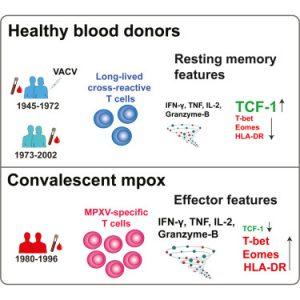In a recent academic paper, researchers have presented compelling evidence demonstrating that vaccines administered against smallpox until the mid-1970s confer enduring cross-reactive immunity to mpox, previously referred to as monkeypox (Figure 1). The pathogen responsible for mpox, classified as an orthopoxvirus, bears striking resemblance to the smallpox virus, which was eventually eradicated in the mid-1970s.
Given the existence of data suggesting that the old smallpox vaccine might offer protection against mpox, the researchers embarked on a study to explore whether individuals who received the smallpox vaccine several decades ago would exhibit any degree of immunity against mpox due to a lingering memory response. The findings of this investigation affirm that such protection indeed exists, implying the exceptional longevity of memory cells, which can recognize closely related viruses such as the mpox virus and conferring overlapping or cross-reactive immunity.
By examining the T-cell immune response in several healthy blood donors, the researchers observed a significantly enhanced immune response against both viral types in individuals born prior to 1976. However, the present study does not elucidate the extent of protection conferred by previous smallpox vaccination. Furthermore, the research demonstrates that the smallpox vaccine can afford approximately 80 percent protection against mpox.
Journal article: Sarah Adamo, S., et al., 2023. Memory profiles distinguish cross-reactive and virus-specific T cell immunity to mpox. Cell Host & Microbe.
Summary by Stefan Botha

